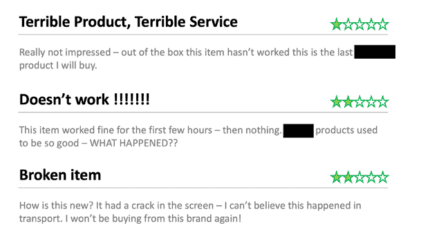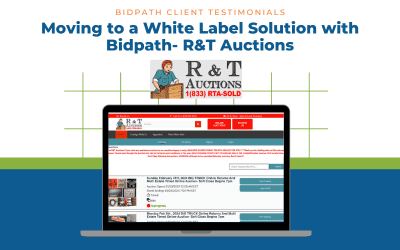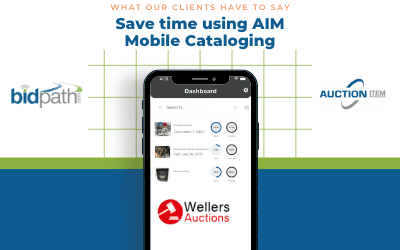Tackling Channel Conflict: 6 Proven Strategies for Reverse Logistics
Part I
Channel conflict from retail returns can have a significant impact on sales of new items, as well as impacting brand reputation. Dan Main looks at the potential negative results of uncontrolled resale of returns, and how to manage this.
Imagine this:

Followed by this:

Thanks to these:

Channel Conflict can be a major issue for anyone selling retail returns without restriction.
Here’s how it happens:
The Risks of Channel Conflict from Retail Returns
- You list your retail returns for sale
- They’re sold to the highest paying buyer, in your country
- The buyer relists them on a marketplace
- You start losing out on new sales to your own retail returns
- Negative reviews for your products appear online
For marketplaces like Amazon, where 82% of SMB sellers are third-party sellers, selling more than 7,400 products per minute, there is a real risk of this happening.
While this a key issue for manufacturers, if you’re a retailer you may also have restrictions on where and how you can resell returns (stipulated by the manufacturer).
So you need to be able to limit the channels and regions an item can be resold in.
BUT – you need to make sure the route you use to sell returns can accommodate this.
Whether it is through a liquidation marketplace, your own platform or a third party, you need to ensure controls are in place to limit the likelihood of items ending up in a channel that could impact you.
Here’s our advice on how to minimise the changes of channel conflict, as well as the ways we can help you achieve this.
How to Manage Channel Conflict from Retail Returns
- Clearly specify resale terms (e.g., region, channel, timing)
- Demand evidence of terms adherence, like proof of export
- Conduct surprise on site checks for compliance
- Monitor field non-compliance; implement 3 strikes policy
- Use tools to prevent problem users registering again
- Sell some items openly and others through private, invite only sales
Here’s a more detailed look at each of these areas above:
1. Clearly Specify Resale Terms
The Problem:
One of the key issues of channel conflict is having returns resold on the same channels in the same region your new stock is sold.
The Solution:
Specifying terms and conditions that require buyers to export the items they purchase (and any other conditions you need to apply) – requiring acceptance before bidding is allowed.
You also should review the users that have access to your sales, only approving them if they can prove they operate out of your main region.
How Bidpath Can Help:
We have specific features in our software to manage this issue, in three key areas:
Terms and Conditions: our system allows you to specify terms on a platform, event or even lot specific level, and buyers need to accept these terms before they can bid. These terms can be incorporated in html format to clearly state the requirements of the purchase, including the need to export items.
User Management: Our user management system includes full details not only of the address of a registrant, but the referral page they came through AND their IP address – while these can be disguised, they provide an extra level of risk management around regional access, and allow you to not only stipulate that items need to be exported, but that the buyers themselves are based out of the domestic region.
Registration: Our system allows you to require registrants to upload identity cards that prove they are based in a specific region.
2. Demand Proof of Terms Adherence
The Problem:
It’s one thing to set terms, it’s another to actually ensure they have been adhered to.
The Solution:
Depending on your domestic region, there are a variety of ways you can ensure an item has been exported, or resold outside of a specific channel. These include:
- Proof of delivery from couriers or logistics companies
- Government approved proof of export forms (depending on country)
- Transport documents – including bill of lading, CMR or Air waybill
How Bidpath Can Help:
Here are some ways you can incorporate proof of adherence to terms within our systems:
Documents: Our system allows for documents to be uploaded by users to their account, in relation to export, resale or any other purpose.
Deposits: You can also take a deposit from a client that is only refunded once proof of export (or other adherence) is received.
3. Conduct Unplanned On-Site Checks for Compliance
The Problem:
Not all compliance aspects relate to export and documents – some may require modifying the item itself, such as debranding.
The Solution:
Sometimes unplanned site visits are the only way to be sure of compliance. We’re not suggesting you do this all the time with trusted buyers, but it can ensure that all requirements are being adhered to. Regular communication and building a relationship with our buyers can mitigate the need for frequent checks.
How Bidpath Can Help:
As one of the largest global independent providers of auction software, we have a wide network of clients and partners. If you can’t get your team to a site, we may be able to provide a local contact to undertake an audit on your behalf.
4. Monitor Field Compliance – Operate a Three Strike Policy
The Problem:
Once you’ve decided how to implement and monitor compliance, decide what to do when buyers are non-compliant.
The Solution:
Depending on the severity and impact of non-compliance, you may want to ban someone immediately for non-compliance, or you could operate a 3-strike policy for less serious incidences.
How Bidpath Can Help:
Our system can provide the following benefits:
User Management: The system can include notes that a buyer has already been flagged for non-compliance 1 or 2 times, then a user can be banned from bidding, or even from viewing the sale events if necessary.
5. Ban Problem Users From Registering With Different Details
The Problem:
When you’ve banned a user for non-compliance, they can register again under a different set of personal details.
The Solution:
Use multiple methods to check whether the same person is registered under different details.
How Bidpath Can Help:
User Management: While we can’t detail the methods used (otherwise that would make it easier for problem users to overcome them), we offer a range of tools that help identify if a banned user is trying to register or bid again and prevent them from doing so.
This also helps to achieve record low default rates in auctions by ensuring only serious bidders are taking part.
6. Be Selective: Sell Some Items Openly and Others Through Private, Invite Only Sales
The Problem:
Some items you sell will be suitable for public, open sales, whereas others will need restrictions – either to protect your own channel sales, or due to terms your suppliers have implemented.
The Solution:
Consider a range of selling methods – public sales for standard items, private sales for any items you need to restrict, with all sales unlisted, requiring registration and approval to access.
How Bidpath Can Help:
We have a private auction facility within our platform – in fact, many of our reverse logistics clients operate entirely private platforms. Our system has the flexibility for you to list some items publicly, and restrict others to a private auction, requiring you to approve registrants before they can even view.
To learn more about how you can take control of your reverse supply chain with Bidpath, check out the links below:
click here
or speak to our sales team for more information at [email protected]

















